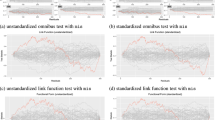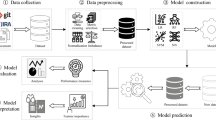Abstract
This Paper proposes a Bayesian approach to find out the optimum stopping rule of software testing. We consider a discrete periodic debugging framework so that software can be released for market once the criteria are fulfilled. Simplification of stopping rules were obtained by using some specific prior distributions of the number of remaining bugs. We also develop necessary and sufficient conditions for stopping the software testing. Some illustrative examples are presented.

Similar content being viewed by others
References
Benkherouf, L., Bather, J.A.: Oil exploration: sequential dicisions in the face of uncertainty. J. Appl. Probab. 25, 529–543 (1988)
Chakraborty, A.K.: Software quality testing and remedies. Ph.D. thesis (1996)
Chakraborty, A.K., Arthanari, T.S.: Optimum testing time for software under an exploration model. Opsearch 31(3), 202–214 (1994)
Das, S., Dewanji, A., Chakraborty, A.K.: Software reliability modeling with periodic debugging schedule. IEEE Trans. Reliab. 65(3), 1449–1456 (2016)
Dewanji, A., Sengupta, D., Chakraborty, A.K.: A discrete time model for software reliability with application to a flight control software. Appl. Stoch. Models Bus. Ind. 27, 723–731 (2011)
Ghosh, S., Roy, S., Chakraborty, A.K.: Determining optimum software release time with Euler distribution as a prior for the number of undiscovered bugs. In: John, B., Acharya, U.H., Chakraborty, A.K. (eds.) Quality and Reliability Engineering-Recent Trends and Future Directions, pp. 302–312. Allied Publisher, New Delhi (2013)
Jelinski, Z., Moranda, P.B.: Software reliability research. In: Shooman, M.L., Freiburger, W. (eds.) Statistical Computer Performance Evaluation, pp. 465–484. Academic Press, New York (1972)
Koch, H.S., Kubat, P.: Optimal release time of computer software. IEEE Trans. Softw. Eng. 9(3), 323–327 (1983)
Lai, R., Garg, M., Kapur, P.K., Liu, S.: A study of when to release a software product from the perseptive of software reliability models. J. Softw. 6(4), 651–661 (2011)
Li, X., Xie, M., Ng, S.H.: Sensitivity analysis of release time of software reliability models incorporating testing effort with multiple change-points. Appl. Math. Modell. 34, 3560–3570 (2010)
Musa, J.D., Iannino, A., Okumoto, K.: Software Reliability: Measurement, Prediction, Application. McGraw-Hill, Inc., New York (1987)
Nayak, T.K.: Estimating population size by recapture sampling. Biometrika 75, 113–120 (1988)
Okumoto, K., Goel, A.L.: Optimum release time for software systems based on reliability and cost criteria. J. Syst. Softw. 1, 315–318 (1980)
Worwa, K.: Adiscrete-time software reliability-growth model and its application for predicting the number of errors encountered during program testing. Control Cybern. 34, 589–606 (2005)
Yang, M.C.K., Chao, A.: Reliability estimation and stopping-ruls for software testing, based on repeated appearances of bugs. IEEE Trans. Reliab. 44, 315–321 (1995)
Author information
Authors and Affiliations
Corresponding author
Additional information
Publisher's Note
Springer Nature remains neutral with regard to jurisdictional claims in published maps and institutional affiliations.
Rights and permissions
About this article
Cite this article
Chakraborty, A.K., Basak, G.K. & Das, S. Bayesian optimum stopping rule for software release. OPSEARCH 56, 242–260 (2019). https://doi.org/10.1007/s12597-018-00353-0
Accepted:
Published:
Issue Date:
DOI: https://doi.org/10.1007/s12597-018-00353-0




